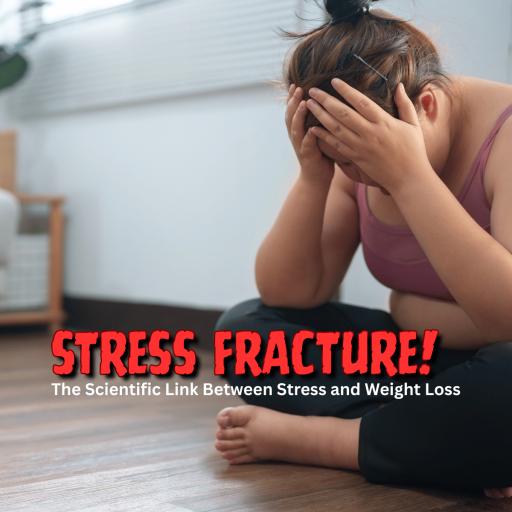Stress Fracture!
The Scientific Link Between Stress and Weight Loss

Stress is part of life, but chronic stress can affect weight control. Short, acute stress may blunt appetite for a bit, while ongoing stress more often pushes eating upward and makes weight loss harder.
People say “stress causes weight gain,” but stress mainly changes how we handle and choose calories. Hormones like cortisol influence appetite and fat distribution. Weight gain still requires a calorie surplus. Hormones don’t create fat from nothing; they tilt behavior and metabolism so surplus is more likely.
Cortisol: The Stress Hormone
The adrenal glands release cortisol during the stress response. This helps in short bursts. With chronic stress, persistently higher cortisol can shift metabolism and behavior in ways that favor weight gain.
How Cortisol Affects Your Body
Cortisol influences many parts of weight control. In the short term it can dull hunger; with ongoing stress it often nudges people toward calorie-dense foods and larger portions. It also shifts where fat is stored, favoring the abdominal area, and can interfere with insulin’s action. Over time, higher cortisol may reduce sleep quality, lower non-exercise movement, and slow muscle protein building while speeding breakdown. These changes do not create fat without extra calories, but they make a surplus more likely and harder to correct. The table below summarizes key effects and why they matter during a fat-loss phase.
| Impact of High Cortisol | Scientific Explanation |
| Increased appetite and cravings | Higher cortisol is linked to greater intake of calorie-dense “comfort” foods and stress-eating behavior. |
| Fat storage | Cortisol is associated with more visceral fat in the abdominal region, which carries higher cardiometabolic risk. |
| Insulin resistance | Chronic glucocorticoid exposure impairs insulin action in liver, muscle, and adipose tissue, raising diabetes risk. |
| Muscle loss | Glucocorticoids are catabolic in muscle. Less muscle lowers daily energy use, which can make weight regain easier. |
Breaking the Cycle: Managing Stress for Weight Loss
Exercise: Regular physical activity improves stress resilience and sleep and is associated over time with a healthier daily cortisol pattern. A tough workout can raise cortisol briefly; the long-term training effect is helpful.
Mindfulness and relaxation: Practices like meditation, breathing exercises, and yoga can reduce perceived stress and stress-eating.
Adequate sleep: Short sleep often raises evening cortisol in some studies and, more consistently, shifts appetite hormones (higher ghrelin, lower leptin), increasing hunger and calorie intake. Aim for 7–9 hours per night.
Updated: August 13, 2025 10:19
Category: Wellness
Keywords: Stress Cortisol Weight loss Metabolism Visceral fat
References
Dallman MF, Pecoraro N, Akana SF, la Fleur SE, Gomez F, Houshyar H, Bell ME, Bhatnagar S, Laugero KD, Manalo S. Chronic stress and obesity: a new view of “comfort food”. Proc Natl Acad Sci U S A. 2003;100(20):11696–11701. PMID: 12975524. PubMed: https://pubmed.ncbi.nlm.nih.gov/12975524/ DOI: https://doi.org/10.1073/pnas.1934666100
Epel ES, McEwen B, Seeman T, Matthews K, Castellazzo G, Brownell KD, Bell J, Ickovics JR. Stress and body shape: stress-induced cortisol secretion is consistently greater among women with central fat. Psychosom Med. 2000;62(5):623–632. PMID: 11020091. PubMed: https://pubmed.ncbi.nlm.nih.gov/11020091/ DOI: https://doi.org/10.1097/00006842-200009000-00005
Beaupere C, Liboz A, Fève B, Blondeau B, Guillemain G. Molecular mechanisms of glucocorticoid-induced insulin resistance. Int J Mol Sci. 2021;22(2):623. PMID: 33435513. PubMed: https://pubmed.ncbi.nlm.nih.gov/33435513/ DOI: https://doi.org/10.3390/ijms22020623
Schakman O, Kalista S, Barbé C, Loumaye A, Thissen JP. Glucocorticoid-induced skeletal muscle atrophy. Int J Biochem Cell Biol. 2013;45(10):2163–2172. PMID: 23806868. PubMed: https://pubmed.ncbi.nlm.nih.gov/23806868/ DOI: https://doi.org/10.1016/j.biocel.2013.05.036
Leproult R, Copinschi G, Buxton O, Van Cauter E. Sleep loss results in an elevation of cortisol levels the next evening. Sleep. 1997;20(10):865–870. PMID: 9415946. PubMed: https://pubmed.ncbi.nlm.nih.gov/9415946/
Spiegel K, Tasali E, Penev P, Van Cauter E. Sleep curtailment in healthy young men is associated with decreased leptin levels, elevated ghrelin levels, and increased hunger and appetite. Ann Intern Med. 2004;141(11):846–850. PMID: 15583226. PubMed: https://pubmed.ncbi.nlm.nih.gov/15583226/ DOI: https://doi.org/10.7326/0003-4819-141-11-200412070-00008
De Nys L, Anderson K, Ofosu EF, Ryde GC, Connelly J, Whittaker AC. The effects of physical activity on cortisol and sleep: a systematic review and meta-analysis. Psychoneuroendocrinology. 2022;143:105843. PMID: 35777076. PubMed: https://pubmed.ncbi.nlm.nih.gov/35777076/ DOI: https://doi.org/10.1016/j.psyneuen.2022.105843
Comments
You must log in to post a comment.